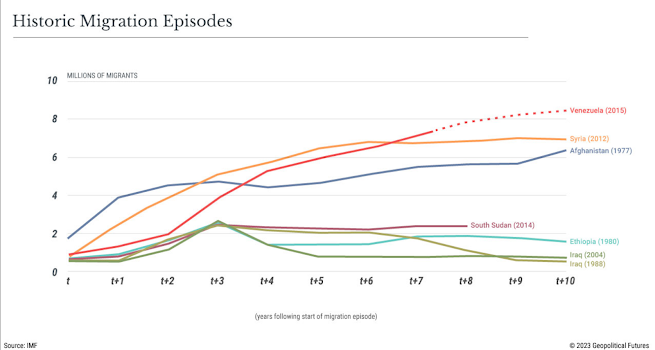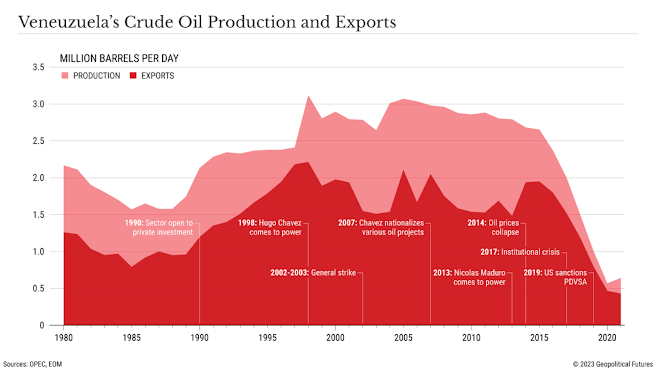Colombia’s Interest in Ending the Venezuelan Crisis
Resolution of the crisis could improve Bogota’s regional standing.
By: Allison Fedirka
Venezuelans will have an opportunity to resolve their country’s political crisis during the 2024 presidential election.
However, several things would need to go right.
The Colombian government is hard at work to make sure that they do.
Colombia has a fundamental interest in Venezuela’s stability and economic well-being.
Declining living conditions in Venezuela have sparked a mass emigration to Colombia, or through it en route to other destinations.
At immense financial, administrative and security costs to itself, Colombia, a country with a population of a little over 50 million, hosts nearly 2.5 million Venezuelans.
Others enter Colombia to buy cheaper goods, which they then consume or resell in Venezuela, leading to shortages of some goods in border towns.
And the pervasive lawlessness has propped up Colombian militant groups, most notably the National Liberation Army (ELN).
At the same time, Colombia wants to reap the rewards of being Washington’s preferred partner in the U.S.’ Caribbean strategy.
Bogota worries that a U.S.-Venezuela rapprochement would divert U.S. aid to support humanitarian and reconstruction efforts in Venezuela, while private investors could sideline Colombia for new opportunities across the border.
To ensure that it has a place at the table, Colombia is positioning itself as a regional leader and the protector of other Latin American states impacted by the Venezuelan crisis.
When President Gustavo Petro took office last year, he immediately restored diplomatic ties with Venezuela, opening a direct line to the Maduro government.
He plans to host a meeting in April of U.S., Latin American and European officials to discuss Venezuela, with the goal of establishing a working group to outline a technical and political roadmap for sanctions relief.
Informally, Washington has said it will attend the event, which it has helped coordinate.
The end goal is to get the Venezuelan government and opposition back to the negotiating table so that they can agree on how to conduct next year’s elections and end the political gridlock.
Previous talks in Mexico stalled after both sides insisted on preconditions.
The Maduro government (and the opposition) wanted the lifting of sanctions on the state oil company, PDVSA, which Washington rejected.
The opposition demanded that the government release political prisoners and hold fair elections.
Colombia is offering itself as an interlocutor that can break the stalemate.
It understands the importance of getting U.S. and European buy-in for a reset, since they will need to recognize the legitimacy of any election and they will be critical sources of investment for Venezuela’s reconstruction.
Colombia also stands to improve its standing with other South American countries hosting Venezuelan refugees.
Colombia has been hardest hit, but others have also incurred extra expenses from providing for the influx of refugees and migrants.
Despite their best efforts, Latin American governments have not received significant funding from international organizations to help with the refugee and migrant flow.
The crisis has also damaged some bilateral relationships, such as between Peru and Ecuador, and Chile and Bolivia.
If Colombia can claim credit for helping to resolve the Venezuelan crisis, and ending the migration problem, then its reputation among its neighbors will get a boost.
There are also signs that Bogota is working to link the Colombian and Venezuelan energy sectors.
This would ensure Colombia’s direct involvement in reconstruction efforts and keep it from being completely bypassed for future investments.
Both governments have recently talked about the need to boost natural gas production, where energy-rich Venezuela has a key role to play.
Colombia’s Ecopetrol has asked the U.S. to waive sanctions to allow it to negotiate with PDVSA.
Colombia is also studying purchases of gas from Venezuela and considering buying the Monomeros fertilizer plant from PDVSA.
Finally, Ecopetrol also has an advisory contract to export and distribute natural gas from Colombia.
In the past, Venezuela was a major oil supplier to Central American and Caribbean nations heavily dependent on energy imports.
Though it will take years and billions of dollars in investment to restore Venezuela’s oil and gas production potential, now is the time to start envisioning such projects.
For its part, the Maduro government has taken some steps to justify the lifting of oil sanctions.
Earlier in March, the government announced that it had uncovered a major corruption scandal involving the disappearance of between $3 billion and $5 billion from PDVSA.
The sum represented 12 percent of 2022 revenue and led to the dismissal of several officials, as well as the resignation of Oil Minister Tareck El Aissami.
President Nicolas Maduro immediately ordered PDVSA’s restructuring and announced the reorganization of the country's National Superintendence of Cryptoassets.
In addition to needing all the funding it can get, the Maduro government is eager to portray itself as trustworthy and transparent so that sanctions might be eased.
Colombia’s intentions and strategy are clear, but execution requires it to overcome two main challenges that are beyond its control.
First, it needs Venezuela to reduce its involvement with rebel groups like the ELN.
This is hard for Caracas to do, given the financial and strategic benefits of the relationships.
Second, it needs the U.S. to agree to lift sanctions.
On March 27, Colombian Foreign Minister Alvaro Leyva met with U.S. Secretary of State Antony Blinken to coordinate plans related to the upcoming summit on Venezuela.
(He also said that Colombia would not pull any surprises and that Maduro may be present.)
Some members of the U.S. government remain skeptical of the Colombian strategy given the ELN’s relationship with drug trafficking and the Maduro regime, while others said sanctions will be lifted only once democracy is restored in Venezuela.
In any case, Colombia is setting itself up to lead the crisis resolution effort, and it stands to reap economic benefits associated with Venezuela’s eventual reconstruction.




0 comments:
Publicar un comentario